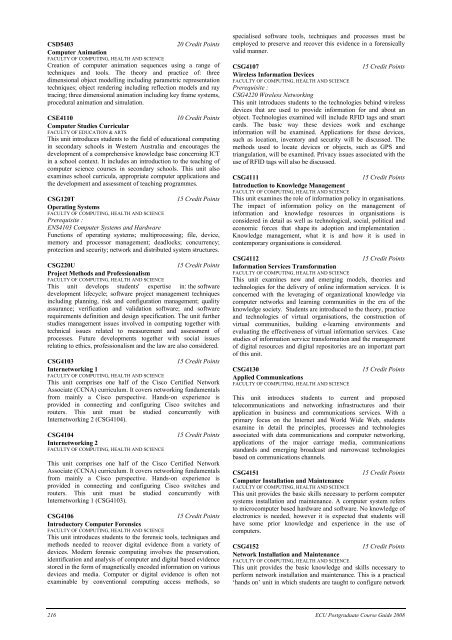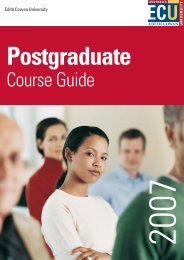Postgraduate - Edith Cowan University
Postgraduate - Edith Cowan University
Postgraduate - Edith Cowan University
Create successful ePaper yourself
Turn your PDF publications into a flip-book with our unique Google optimized e-Paper software.
CSD5403 20 Credit Points<br />
Computer Animation<br />
FACULTY OF COMPUTING, HEALTH AND SCIENCE<br />
Creation of computer animation sequences using a range of<br />
techniques and tools. The theory and practice of: three<br />
dimensional object modelling including parametric representation<br />
techniques; object rendering including reflection models and ray<br />
tracing; three dimensional animation including key frame systems,<br />
procedural animation and simulation.<br />
CSE4110 10 Credit Points<br />
Computer Studies Curricular<br />
FACULTY OF EDUCATION & ARTS<br />
This unit introduces students to the field of educational computing<br />
in secondary schools in Western Australia and encourages the<br />
development of a comprehensive knowledge base concerning ICT<br />
in a school context. It includes an introduction to the teaching of<br />
computer science courses in secondary schools. This unit also<br />
examines school curricula, appropriate computer applications and<br />
the development and assessment of teaching programmes.<br />
CSG120T 15 Credit Points<br />
Operating Systems<br />
FACULTY OF COMPUTING, HEALTH AND SCIENCE<br />
Prerequisite :<br />
ENS4103 Computer Systems and Hardware<br />
Functions of operating systems; multiprocessing; file, device,<br />
memory and processor management; deadlocks; concurrency;<br />
protection and security; network and distributed system structures.<br />
CSG220U 15 Credit Points<br />
Project Methods and Professionalism<br />
FACULTY OF COMPUTING, HEALTH AND SCIENCE<br />
This unit develops students' expertise in: the software<br />
development lifecycle; software project management techniques<br />
including planning, risk and configuration management; quality<br />
assurance; verification and validation software; and software<br />
requirements definition and design specification. The unit further<br />
studies management issues involved in computing together with<br />
technical issues related to measurement and assessment of<br />
processes. Future developments together with social issues<br />
relating to ethics, professionalism and the law are also considered.<br />
CSG4103 15 Credit Points<br />
Internetworking 1<br />
FACULTY OF COMPUTING, HEALTH AND SCIENCE<br />
This unit comprises one half of the Cisco Certified Network<br />
Associate (CCNA) curriculum. It covers networking fundamentals<br />
from mainly a Cisco perspective. Hands-on experience is<br />
provided in connecting and configuring Cisco switches and<br />
routers. This unit must be studied concurrently with<br />
Internetworking 2 (CSG4104).<br />
CSG4104 15 Credit Points<br />
Internetworking 2<br />
FACULTY OF COMPUTING, HEALTH AND SCIENCE<br />
This unit comprises one half of the Cisco Certified Network<br />
Associate (CCNA) curriculum. It covers networking fundamentals<br />
from mainly a Cisco perspective. Hands-on experience is<br />
provided in connecting and configuring Cisco switches and<br />
routers. This unit must be studied concurrently with<br />
Internetworking 1 (CSG4103).<br />
CSG4106 15 Credit Points<br />
Introductory Computer Forensics<br />
FACULTY OF COMPUTING, HEALTH AND SCIENCE<br />
This unit introduces students to the forensic tools, techniques and<br />
methods needed to recover digital evidence from a variety of<br />
devices. Modern forensic computing involves the preservation,<br />
identification and analysis of computer and digital based evidence<br />
stored in the form of magnetically encoded information on various<br />
devices and media. Computer or digital evidence is often not<br />
examinable by conventional computing access methods, so<br />
specialised software tools, techniques and processes must be<br />
employed to preserve and recover this evidence in a forensically<br />
valid manner.<br />
CSG4107 15 Credit Points<br />
Wireless Information Devices<br />
FACULTY OF COMPUTING, HEALTH AND SCIENCE<br />
Prerequisite :<br />
CSG4220 Wireless Networking<br />
This unit introduces students to the technologies behind wireless<br />
devices that are used to provide information for and about an<br />
object. Technologies examined will include RFID tags and smart<br />
cards. The basic way these devices work and exchange<br />
information will be examined. Applications for these devices,<br />
such as location, inventory and security will be discussed. The<br />
methods used to locate devices or objects, such as GPS and<br />
triangulation, will be examined. Privacy issues associated with the<br />
use of RFID tags will also be discussed.<br />
CSG4111 15 Credit Points<br />
Introduction to Knowledge Management<br />
FACULTY OF COMPUTING, HEALTH AND SCIENCE<br />
This unit examines the role of information policy in organisations.<br />
The impact of information policy on the management of<br />
information and knowledge resources in organisations is<br />
considered in detail as well as technological, social, political and<br />
economic forces that shape its adoption and implementation .<br />
Knowledge management, what it is and how it is used in<br />
contemporary organisations is considered.<br />
CSG4112 15 Credit Points<br />
Information Services Transformation<br />
FACULTY OF COMPUTING, HEALTH AND SCIENCE<br />
This unit examines new and emerging models, theories and<br />
technologies for the delivery of online information services. It is<br />
concerned with the leveraging of organizational knowledge via<br />
computer networks and learning communities in the era of the<br />
knowledge society. Students are introduced to the theory, practice<br />
and technologies of virtual organisations, the construction of<br />
virtual communities, building e-learning environments and<br />
evaluating the effectiveness of virtual information services. Case<br />
studies of information service transformation and the management<br />
of digital resources and digital repositories are an important part<br />
of this unit.<br />
CSG4130 15 Credit Points<br />
Applied Communications<br />
FACULTY OF COMPUTING, HEALTH AND SCIENCE<br />
This unit introduces students to current and proposed<br />
telecommunications and networking infrastructures and their<br />
application in business and communications services. With a<br />
primary focus on the Internet and World Wide Web, students<br />
examine in detail the principles, processes and technologies<br />
associated with data communications and computer networking,<br />
applications of the major carriage media, communications<br />
standards and emerging broadcast and narrowcast technologies<br />
based on communications channels.<br />
CSG4151 15 Credit Points<br />
Computer Installation and Maintenance<br />
FACULTY OF COMPUTING, HEALTH AND SCIENCE<br />
This unit provides the basic skills necessary to perform computer<br />
systems installation and maintenance. A computer system refers<br />
to microcomputer based hardware and software. No knowledge of<br />
electronics is needed, however it is expected that students will<br />
have some prior knowledge and experience in the use of<br />
computers.<br />
CSG4152 15 Credit Points<br />
Network Installation and Maintenance<br />
FACULTY OF COMPUTING, HEALTH AND SCIENCE<br />
This unit provides the basic knowledge and skills necessary to<br />
perform network installation and maintenance. This is a practical<br />
‘hands on’ unit in which students are taught to configure network<br />
216 ECU <strong>Postgraduate</strong> Course Guide 2008



